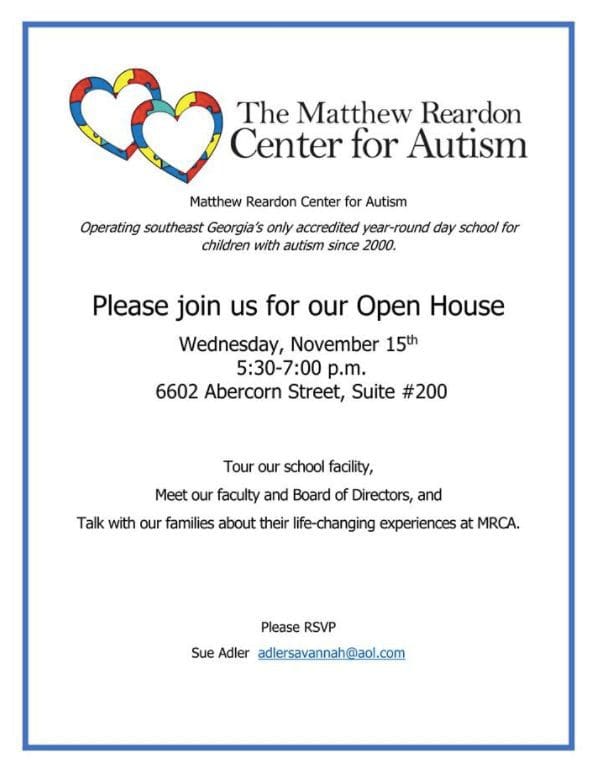Ten Things Parents Should Know about Autism
Matthew Reardon Center for Autism Open House Nov 15
With 1 in 68 children, 1 in 44 boys, and 1% of USA population having an autism spectrum disorder (ASD), the below list will help parents identify signs and symptoms of autism.
They can also stop by The Open House for The Matthew Reardon Center for Autism, taking place Wednesday, Nov. 15, 5:30-7:00 pm.
The Center for Autism operates southeast Georgia’s only accredited year-round day school for children with autism as part of the ADVANCE Academy. For more information visit http://www.matthewreardon.org/
The following is a modified excerpt from Ron Sandison’s blog, 10 Things Teachers should know about Autism.
1.Every child with autism is unique. Some children are nonverbal and may never be able to speak. Many children with autism are highly intelligent and learn to read and write at an early age. Some children with an autism diagnosis can have an unbelievable gift for math, music, or art. Parents should know that autism is a spectrum, and each child is distinct and should not be labeled based on his or her place on the bell-shaped curve. A high-support child may not be a low-functioning child.
2.Every child with autism has his or her own strengths and weaknesses. Parents must use learning styles that fit the child’s strengths.
3.Children with autism usually have a special interest. We should use the child’s passion as a motivational tool for learning new subjects. Julie Ann Reed, whose son has Asperger’s, said, “If your son or daughter has an obsession, use it to help him or her to learn new material. My son Paul is obsessed with computers; so I use computers as a reward system.”
4. Children with autism usually have repetitive behavioral patterns. Parents should understand a child’s routine and help him to follow his patterns to prevent a tantrum or meltdown. Disruptions in schedule can result in extreme anxiety and anger.
5.Children with autism usually have sensory issues. Most of us pay little attention to our senses. When you feel cold, you put on a sweater. When music is too loud, you turn down the volume. For some children with autism, senses provide unreliable information causing great discomfort and anxiety. These children may experience sensory issues with touch, sound, taste, smell, or sight. Parents need to be aware of sensory issues a child may experience in his environment.
6.Children with autism may display stimming behavior. When you bite your nails, tap your pencil, or twirl your hair, you are engaging in the behavior pattern called stimming. This behavior with children of autism can include flapping their hands up-and-down, pacing in circles, rocking back-and-forth, or spinning their whole body. Autistic stimming can be a hindrance by prohibiting the child from interacting with peers.
7. Children with autism tend to experience difficulty with understanding verbal instructions. Parents should relay their instructions in easy-to-follow steps and also use visual aids to ensure your child understands your instructions.
8. Children with autism may have difficultly decoding social cues. Inability to interpret nonverbal communication will cause a child to feel awkward in social settings. Parents should teach students with autism to model their peers through deliberate and specific observation and instruction.
9.Children with autism who lack social skills may make inappropriate and mean comments. Parents need to be prepared for a child with autism to say hurtful words and not to take those comments personally. Teach the child by your own example to say words of praise and thanksgiving.
10. Like all children, children with autism need your love and encouragement. Many children with autism may feel isolated due to having been bullied. Your love and support will encourage your students.
MRCA also offers regular instructional and training opportunities to parents and family members, educators, health professionals, college interns and self-advocates.
Ron Sandison works full-time in the medical field and is a professor of theology at Destiny School of Ministry. He is a task force member for the Autism Society’s Faith Initiative and is on the autism spectrum. (http://www.autism-society.org/10-things-every-teacher-know-autism/)

ABOUT THE MATTHEW REARDON CENTER FOR AUTISM (MRCA):
MRCA operates southeast Georgia’s only accredited year-round day school for children with autism. They have provided advocacy and outreach services to more than 800 families across southeast Georgia and have hosted professional training and instructional opportunities for more than 4,000 family members, educators, health professionals and self-advocates. The organization was incorporated in 2000 and currently serves 22 students through ADVANCE Academy. They have 11 full-time employees and operate in a 6000 sq foot suite located at 6602 Abercorn St #200, Savannah, GA 31405. Website: http://www.matthewreardon.org/
DIRECTIONS TO MRCA:
The center is located off the Northeast corner where Abercorn St. intersects with Jackson Blvd. (just north of Chucky Cheese), 2nd floor.
CONTACT
Patti T. Victor, President and CEO
The Matthew Reardon Center for Autism, Inc, and Advance Academy
912-355-9098 (office)
912-352-2460 (fax)
pvictor@matthewreardon.org
www.matthewreardon.org
